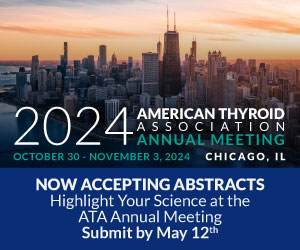ATA, TES, and AACE express disappointment and concern for the health of millions of thyroid patients after FDA announces decision to approve generic substitutes for levothyroxine products
 |
 |
 |
June 24, 2004
The American Thyroid Association (ATA), The Endocrine Society (TES), and the American Association of Clinical Endocrinologists (AACE), representing 4,600 clinical endocrinologists, are deeply disappointed that the FDA has moved to approve generic levothyroxine preparations as equivalent to branded preparations. Levothyroxine is a drug recognized to have a narrow toxic to therapeutic ratio with significant clinical consequences of excessive or inadequate treatment. Some of the potential adverse events include; recurrence of symptoms, osteoporosis, atrial fibrillation, worsening of ischemic heart disease, preterm delivery in pregnancy, and hypercholesterolemia. There are 12 tablet strengths of levothyroxine available that vary by as little as 9% in drug content, reflecting the close titration that is required for optimal patient management. Thirteen million Americans are on levothyroxine products and those especially susceptible to incorrect titration include the elderly, pregnant women and their developing fetuses, and those with thyroid cancer.
The current recommendation by the FDA and our societies is that patients switching between branded levothyroxine products have repeat thyroid function testing. This is to allow for dose retitration if the therapeutic target is not being achieved with the new preparation. Under a policy of allowing generic levothyroxine substitution, more frequent thyroid function testing will be necessary. Furthermore, the patient and doctor may not even be aware of a change in preparation before adverse events occur.
Serious questions have repeatedly been raised about the methodology used by the FDA to determine bioequivalence. The ATA, TES, and AACE have worked with the FDA for over one year to promote a workshop to carefully consider standards of thyroxine bioequivalence and testing. We were assured in a September 15, 2003 meeting with Dr. Janet Woodcock, and by her successor Dr. Steven Galson in a November 5, 2003 letter, that the FDA was “..committed to plan and hold a workshop…to address all of the relevant issues raised at our meeting: [levothyroxine] bioequivalence testing, baseline correction, optimal test subjects, and acceptable confidence limits; and TSH as a pharmacodynamic measure”. Furthermore, the FDA stated, “We acknowledge the concerns raised at the meeting and in your letter regarding the thyroxine dose precision and limitations in current bioequivalence standard”. Despite these assurances and submission of a draft workshop agenda by us on December 30, 2003, the FDA has made this decision without input from clinical endocrinologists, the recognized experts in this area and those who care for thyroid patients.
What should physicians caring for patients on levothyroxine therapy do as a result of this decision?
- Alert your patients that their levothyroxine preparation may be switched at the pharmacy.
- Encourage your patients to ask to remain on their current levothyroxine preparation.
- Make sure your patients understand that if they receive a new levothyroxine preparation, they will need to be retested with a serum TSH to determine if they need dose retitration.
See related articles on Bioequivalence of Levothyroxine



